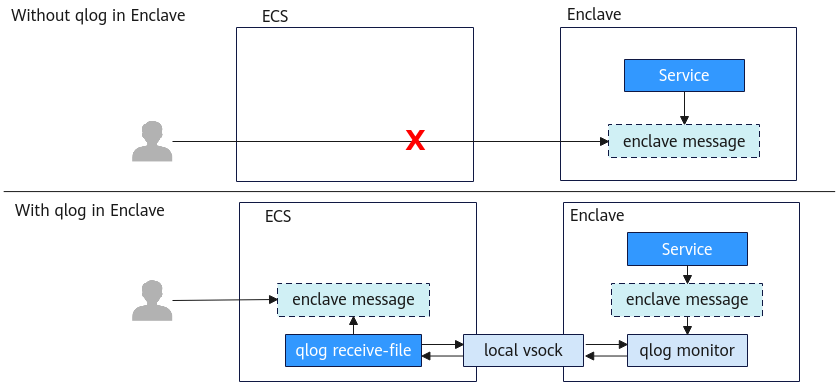QingTian Enclave日志转发工具
QingTian Enclave日志转发工具(qlog)概述
qlog(QingTian Enclave log)是QingTian Enclave的运维工具。QingTian Enclave是运行在QingTian架构虚拟机中完全隔离的子虚拟机,即使是root用户也不能直接通过ssh登入。因此,为了方便运维人员监控运行在QingTian Enclave中的业务和定位问题,我们推出了qlog工具。qlog可以收集QingTian Enclave虚拟机中指定的日志文件和资源使用情况,并将结果发送到父虚拟机中。目前qlog支持收集QingTian Enclave中的资源使用情况包括CPU使用率和内存使用率。
qlog是一个可执行二进制文件,需要在父虚拟机中和QingTian Enclave中通过不同的命令运行:
- 在父虚拟机中,通过执行“/path/to/qlog receive-file <cid>/path/to/config_qlog.toml”命令启用qlog。
- 在QingTian Enclave中,通过执行“/path/to/qlog monitor /path/to/config_qlog.toml”命令启用qlog。
传统虚拟机中业务的日志会直接存储在类似“/var/log/service.log”的目录文件当中。
在将业务移植到QingTian Enclave中之后,通过qlog工具,可以将上述日志文件("/var/log/service.log")导出到父虚拟机当中。
使用同一个qlog二进制文件,通过qlog receive-file和qlog monitor命令,使其分别运行在父虚拟机和QingTian Enclave中,两者会建立基于local vsock的通信链路。运行在QingTian Enclave中的qlog组件会收集指定的业务日志或QingTian Enclave的资源使用情况,将收集到的数据发送给父虚拟机中的qlog组件。父虚拟机中的qlog组件再将接收到的数据储存到指定的文件中,如“/var/log/qlog/service.log”。

本文介绍qlog的操作步骤。
前提条件
- 获取qlog程序。
git clone https://gitee.com/HuaweiCloudDeveloper/huawei-qingtian.git
- 获取cargo工具链。
- 执行下述命令安装rustup
curl --proto '=https' --tlsv1.2 -sSf https://sh.rustup.rs | sh
- 安装完成后执行下述命令加载rustup
source $HOME/.cargo/env
- 执行下述命令验证rustc和cargo安装成功
rustc -V cargo -V
- 执行下述命令安装rustup
- qlog的前置依赖。
表1 前置依赖 依赖项
最低测试版本
glibc
2.34
cargo
1.77.0
- QingTian Enclave的环境准备。
- 安装qt CLI工具和其他必要rpm包。
- 安装Docker。
- 安装python3以及几个必要的python module : docker和knack。
操作步骤
- 构建qlog。
进入qingtian-tools/qlog目录中,执行cargo命令:
cargo build --release
生成的qlog程序在目录qingtian-tools/qlog/target/release下。
- 创建工作目录。
新建工作目录workspace,将qlog程序拷贝到workspace下,后续创建的文件都放在workspace中。
- 配置config_qlog.toml。
在workspace目录中创建config_qlog.toml文件,内容如下:
port: 6000 workspace: /var/log/qlog server_logfile: server.log client_logfile: client.log server_threads: 4 client_threads: 1 log_level: info rotate_size: 65536 rotate_num: 10 monitor_items: - name: service #业务名 monitor_type: file monitor_path: /var/log/service.log #QingTian Enclave中业务日志的路径 outputfile: service.log #同步到父虚拟机中的日志文件名 - name: resource monitor_type: resource monitor_internel: 15 outputfile: resource.log - 制作含qlog的QingTian Enclave镜像。
- 在workspace目录中创建start.sh脚本:
#/bin/bash /root/qlog monitor /root/config_qlog.toml & LOG_FILE="/var/log/service.log" LOG_MESSAGE="Hello, service." while true; do TIMESTAMP=$(date '+%Y-%m-%d %H:%M:%S') echo "$TIMESTAMP - $LOG_MESSAGE" >> "$LOG_FILE" sleep 3 done
- 赋予start.sh脚本执行权限,在workspace目录中执行下述命令:
chmod +x start.sh
- 在workspace目录中创建Dockerfile文件,内容如下:
FROM ubuntu:22.04 COPY ./qlog /root/qlog COPY ./config_qlog.toml /root/config_qlog.toml COPY ./start.sh /root/start.sh CMD /root/start.sh
- 赋予start.sh执行权限,在workspace目录中执行以下命令:
chmod +x start.sh
- 制作docker镜像,在workspace目录中运行以下命令:
docker build -f Dockerfile -t test_qlog_enclave .
- 制作QingTian Enclave镜像,在workspace目录中运行以下命令:
qt enclave make-img --docker-uri test_qlog_enclave --eif test_qlog_enclave.eif
- 在workspace目录中创建start.sh脚本:
- 启动qlog。
- 启动一台QingTian Enclave,在workspace目录中运行下述命令:
qt enclave start --cpus 2 --mem 1024 --cid 4 --eif test_qlog_enclave.eif
- 启动父虚拟机中的qlog,在workspace目录中运行下述命令:
./qlog receive-file 4 ./config_qlog.toml &
- 父虚拟机中执行下述命令,查看service日志:
tail -F /var/log/qlog/service.log
可以看到每3s,打印一行日志"Hello, service."。
- 父虚拟机中执行下述命令,查看QingTian Enclave中资源使用情况:
tail -F /var/log/qlog/resource.log
可以看到每15s,打印一次CPU使用率和内存使用率。
- 启动一台QingTian Enclave,在workspace目录中运行下述命令:
qlog帮助信息
qlog help
$ qlog --help A tool to monitor logs and resource usage over a Vsock connection Usage: qlog <COMMAND> Commands: monitor Monitor resource usage receive-file Receive data from qlog monitor help Print this message or the help of the given subcommand(s) Options: -h, --help Print help
qlog monitor help
$ qlog help monitor Monitor logs and/or resource usage Usage: qlog monitor [OPTIONS] <CONFIG> Arguments: <CONFIG> A configuration file in yaml format, which defines items to be monitored Options: -c, --cid <CID> CID to listen on (defaults to VMADDR_CID_ANY) [default: 4294967295] -h, --help Print help
qlog receive-file help
$ qlog help receive-file Receive data from qlog monitor Usage: qlog receive-file [OPTIONS] <CID> <CONFIG> Arguments: <CID> Enclave VM's CID <CONFIG> A configuration file in yaml format, which defines items to be monitored Options: -w, --workspace <WORKSPACE> Set to workspace if specified, prior to configuration file -h, --help Print help
配置信息(Config)
|
Variable |
Type |
Description |
|---|---|---|
|
port |
u32 |
vsock端口 |
|
workspace |
String |
写入进程日志和监控数据的工作空间 |
|
server_logfile |
String |
将服务器端(qlog monitor)进程日志写入<workspace>/<server_logfile> |
|
client_logfile |
String |
将客户端(qlog receive-file)进程日志写入<workspace>/<client_logfile> |
|
server_threads |
u32 |
服务器端(qlog monitor)线程数量 |
|
client_threads |
u32 |
客户端(qlog receive-file)线程数量 |
|
log_level |
String |
日志等级(TRACE/DEBUG/INFO/WARN/ERROR/OFF) |
|
rotate_size |
u32 |
可选参数:日志文件转储大小,默认是2MB |
|
rotate_num |
u32 |
可选参数:日志文件转储时,保留旧日志文件数量,默认是10 |
|
monitor_items |
Vector |
监控事物列表 |
|
Variable |
Type |
Description |
|---|---|---|
|
name |
String |
事物名称 |
|
monitor_type |
String |
监控类型:file表示日志文件,resource表示资源使用 |
|
monitor_path |
String |
可选参数,QingTian Enclave中要监控的日志文件路径,monitor_type只能是file |
|
monitor_internel |
u32 |
可选参数,资源监视间隔时间,单位是秒,默认值是15,monitor_type只能是resource |
|
outputfile |
String |
监控数据文件名称,写入监控数据的路径是<workspace>/<outputfile> |
配置文件参考
port: 6000
workspace: /var/log/qlog
server_logfile: server.log
client_logfile: client.log
server_threads: 4
client_threads: 1
log_level: info
rotate_size: 65536
rotate_num: 10
monitor_items:
- name: item1
monitor_type: file
monitor_path: /var/log/item1.log
outputfile: output1.log
- name: item2
monitor_type: file
monitor_path: /var/log/item2.log
outputfile: output2.log
- name: item3
monitor_type: file
monitor_path: /var/log/item3.log
outputfile: output3.log
- name: item4
monitor_type: file
monitor_path: /var/log/item4.log
outputfile: output4.log
- name: item5
monitor_type: resource
monitor_internel: 15
outputfile: output5.log






